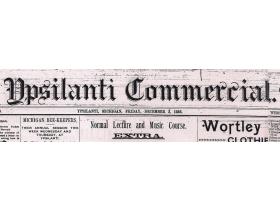Thank you Ypsilanti
Jun. 23, 2010 · 5:07 p.m.

The Ypsilanti Citizen was launched in November 2008 to inform the Ypsilanti community about the news and events that were happening in their area.
Since our launch,...read more
Crossroads Summer Festival; rockin’ ladies night
Jun. 23, 2010 · 4:37 p.m.

A special Ladies Night was held Friday at the 2010 Ypsilanti Crossroads Summer Festival in conjunction with the American Cancer Society’s Relay for Life.
Just...read more
Crossroads to hold Ladies Night for Relay for Life
Jun. 16, 2010 · 9:13 a.m.
On June 11, the 2010 Ypsilanti Crossroads Summer Festival featured a rousing opening set from roots and blue grass band Dragon Wagon.
Dragon Wagon was joined on...read more
Electric rail pollution leads to dirty laundry
Jun. 15, 2010 · 11:42 a.m.

Maggie Smith was not looking forward to a forenoon of sewing pleats.
She put down her newest customer’s summer dress. Downstairs, she offered to get potatoes...read more
EMU students in wartime
Jun. 1, 2010 · 10:32 a.m.

Leroy Grindle was an Ypsilantian soldier who lost his life in WWII. He was a member of the Michigan Normal (EMU) class of ’41, and is memorialized with a black...read more
To the Archives
Nov. 24, 2009 · 9:19 a.m.
Twenty-five different Ypsilanti newspapers have been published between the city’s founding and today, ranging from the short-lived Saw Dust Journal (1839) to the city’s longest-running paper, the Ypsilanti Sentinel (1843-1900). Of these 25, the paper with the highest quotient of editorial cayenne and the most combative relationship with its advertisers and readers was the Ypsilanti Commercial.
In March 1864, Charles Rich Pattison founded the paper as the Ypsilanti True Democrat. Pattison began his local career at age 17 as a schoolteacher two miles west of the city. He obtained a degree from the University of Michigan in 1850 and one from Massachusetts Newton Theological Seminary in 1853, returning to Michigan to work as an ordained Baptist minister. In 1854, he married Ellen Fry, with whom he would have nine children.
In 1865, Pattison changed the name of his paper to the Commercial. Housed in a building on Huron Street, just south of Cross Street, the paper was Pattison’s megaphone for his fiery pro-Temperance, pro-suffrage views. He was not a man of half measures, and seized as the Commercial’s motto “Free to Be Right: To Be Wrong, Never.” His rival was Charles Woodruff of the Ypsilanti Sentinel newspaper, who held opposing beliefs. Pattison often published editorials blasting the Sentinel.
“The most absurd charge ever trumped up is that ‘Free Love,’ so called, has anything to do with woman suffrage,” said Pattison in a May 30, 1874 editorial. “No man, unless innately depraved would make such a base charge. Says the Sentinel, ‘is not [free love advocate] Victoria Woodhull in favor of women’s suffrage?’ No doubt of it. It is the only subject in regard to which she seems to indicate any soundness of mind.”
A month later, he fired again. “Our contemporary [Charles Woodruff] exhibits his general misanthropy by misquoting and distorting sentences in the Woman’s Journal. He knows, for he is not altogether inane, notwithstanding his knavish propensities, that the entire tenor of the Woman’s Journal is in favor of the highest cultivation of domestic and marital ties, the ennobling of these rather than their abolition.”
Pattison also tirelessly blasted the anti-Temperance faction in town and praised the achievements of black Ypsilantians.
In 1886, Pattison sold the Commercial to brothers Henry and Fred Coe. As editor, Henry Coe maintained Pattison’s pro-Temperance, pro-suffrage positions, but introduced a less scorching, more sardonic editorial tone.
One item from January 4, 1889 reads, “‘Liar’s Leagues’ are the latest fads. Each league is composed of nine members, each of whom must be a first-class liar. An attempt to organize a league in Ypsilanti failed for want of material, but we hear there are several in Ann Arbor and more forming daily. One there is made up entirely of newspaper men.”
In addition to jabbing Ann Arbor papers, the Commercial continued to take swipes at hometown papers. In Feb. 1889, the paper criticized the Ypsilantian for publishing old news.
“After T. C. Owen had been manufacturing Toilet Soap from his Mineral Water for over a year, and the Commercial job department had printed over a hundred thousand wrappers for him, the Ypsilantian suddenly, and without giving its readers the least warning, one day announced that Mr. Owen had begun to manufacture soap.
The paper continued, “The September ’88 number of the Normal News, and each of the six succeeding issues, announced in the advertising columns that Mr. Owen had changed the name of his Mineral water and products to “Atlantis,” instead of “Ypsilanti.” Yesterday, our contemporary tried to palm that fact off on an unsuspecting public as fresh news . . . [s]uch enterprise on the part of our brother news-gatherer is remarkable!”
Coe also promoted advertising, publishing the following tidbit on February 8, 1889: “Miss Smythe (to Editor): ‘Oh, Mr. Coe, I think your paper is just splendid! Last week I advertised in the Commercial for my lost bracelet, and I found it the very next day, tight on the piano—just where I had left it!’ Notwithstanding the receipt of the above unsolicited testimonial, our rate for local readers still remains the same, 5 cents a line each insertion.”
Later that spring, the paper said, “Last week the Commercial headed its local column, ‘We need rain.’ On Saturday night, just as soon as the papers got thoroughly circulated, it began to rain, and has been at it, off and on, all the week. Notwithstanding this new evidence of the efficacy of advertising, our old advertising rates still continue in force.”
But Coe’s humor evaporated after an incident that led to a vinegary editorial. In early March, the paper published a rambling pro-Temperance letter to the editor that sprawled over two columns. The author, not satisfied to have been given so much space, wrote back an even longer, windier letter pointing out several tiny errors the Commercial had printed. The letter in part reads,
“EDITOR COMMERCIAL: Your compositor made some mistakes in my article which you published last week. The errors do not render the phrases where they occur entirely senseless, yet do not convey the meaning I had in mind… I am sure the manuscript was correct, but my chirography being none of the best, the ‘lapsus typo’ was rather a natural one… you have it ‘In answer’ while it was intended to be, I answer. Then near the bottom of the same column the printer makes it read, The morals of the business men, etc. stands prominent. It was intended to be, the morale of the business men—stands pre-eminent. I was sincere in paying a tribute to the business men of Ypsilanti…” The writer droned on for another few hundred words, all of which were, again, published in the paper.
But this correction was the proverbial straw. In the same issue of the Commercial, an exasperated Henry Coe put Ypsilanti on notice.
“As the Commercial is just starting on its 26th year, it may not be deemed inappropriate to state some of our plans for the future.
“On paying his subscription, each new subscriber will be asked how he likes the size of the paper. If he says it ought to be made larger or smaller, it will be changed to suit each one.
“‘Top column position next reading on first page’ will be given each advertiser.
“Any subscriber finding a word misspelled or other error in his paper should inform the editor; and the proof-reader, foreman, compositor, pressman, and other office employees, will be blown from the mouth of a cannon in front of the office at once.
“The matter appearing in the local column shall please everybody. In case the publication of a certain item will displease one and its suppression displease another, we will suspend publication entirely for a few weeks. We are bound to please both of ’em.
“During the coming year we will devote more space to reading matter to please ‘A Well Wisher,’ more space to advertising to please our creditors, and make our paper smaller to please ‘Old Subscriber,’ who wants it to fit her pantry shelves.
“The editor will always be glad to hear that some other paper is ‘the best in the city.’”
Anyone saying so at the time would have been incorrect. For its venerable 35-year run, the Commercial was the most lively and entertaining paper in town.
Laura Bien is the author of "Tales from the Ypsilanti Archives," to be published this winter. She also writes the historical blog "Dusty Diary" and may be contacted at ypsidixit@gmail.com.
© 2010 The Mojo News Group - Ypsilanti Citizen Home - About Ypsilanti Citizen - Contact Us - Advertising - Calendar - Archives - Terms of Use







